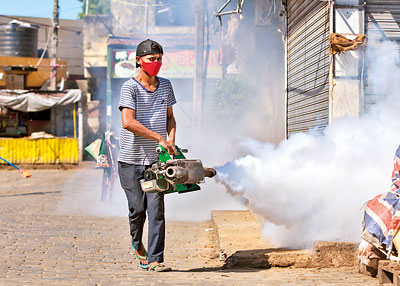News
Rains and end of curfew signal rise in dengue
Officials are preparing for a rise in dengue cases caused by rains and the resumption of normal life following the lifting of curfew.
A three-day control programme organised by the National Dengue Control Unit (NDCU) will commence from June 11-13, with schools, government institutions, quarantine camps and hospitals the main focus.
NCDU Director Dr. Aruna Jayasekera said because a peak is expected in June and July the public needed to be vigilant in reducing mosquito breeding grounds.

Dengue prevention programme underway in Colombo. Pic by Sameera Weerasekera
“The main concern is that people have started moving around after staying indoors for two months and this might lead them to neglect their surroundings yet again,” he said.
There were 20,216 dengue cases existent on June 3, the NCDU said.
The Colombo Regional Director of Health Services reported 2,901 cases while Trincomalee reported 2,218, Batticaloa, 2,129 and Jaffna, 1,847 cases.
President Gotabaya Rajapaksa and Prime Minister Mahinda Rajapaksa this week issued directives to governors and local government authorities to prepare a mechanism to control an imminent outbreak.
Instructions have been given that Environmental Police units should monitor risk areas in collaboration with health authorities and local government organisations.
The President and the Prime Minister have called for follow-up meetings once a week to evaluate progress.
A four-day cleaning programme was launched on Thursday in areas identified as high-risk areas in Colombo city limits.
On the first day alone, 2,883 houses were inspected and the aim is to inspect 10,000 houses by the end of the programme, the Colombo Municipal Council’s Chief Medical Officer, Dr. Ruwan Wijayamuni, said.
He said between from January to mid-March, 189 cases had been filed against individuals charged with allowing dengue breeding places to exist on their properties. Last year there were 893 cases and fines amounting to Rs. 2.7 million.
“The only positive outcome of the pandemic was that people started cleaning their houses, as a result of which the number of breeding places in houses have been greatly reduced,” he said.
Dr. Wijayamuni pointed out that mosquito density had risen this year.
“There have already been 22 dengue deaths – that is twice the number that fell prey to COVID-19, which is an indication that dengue should not be neglected,” he said.
“We are hoping to revive the dengue rapid response team this year but the most important message to the general public is that we need community participation, which is vital in combating this disease,” Dr. Wijayamuni said.
“I carried out inspections on houses, shops and construction sites in Fort. In most of the houses, rain gutters were creating the greatest number of potential breeding places for mosquitoes,” the Public Health Inspector (PHI) for Fort, M.B. Lal Kumara, said.
“Dengue cases are gradually increasing in the Kandy area. There were reports of 51 dengue cases just last week,” the Kandy Regional Director of Health Services, Dr. Nidhershini Periyasamy, said.
Kandy Municipal Council, Gangawatakorale, Kundasale and Yatinuwara have been identified as high-risk areas.
Ten teams composed of members of the armed forces, police and health authorities will be employed in the June 11-13 control programme in the Kandy area.
The Gampaha Regional Director of Health Services, Dr. Chandrani Senaratne, said attention to combating dengue had been blocked by the coronavirus curfew, which had prevented dengue prevention teams from being mobilised.
The Gampaha RDHS has identified Seeduwa, Biyagama and Dompe as high-risk areas.
Dr, Senaratne also feared there would be an increase in dengue cases now that the curfew had been lifted.
“Schools, religious institutions, government institutions and construction sites reported a 100 per cent increase in the number of potential breeding sites,” she said.


